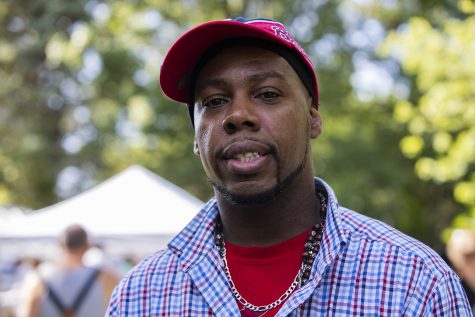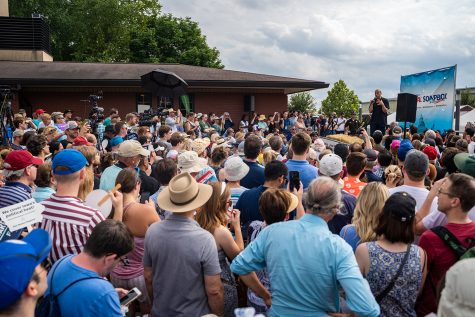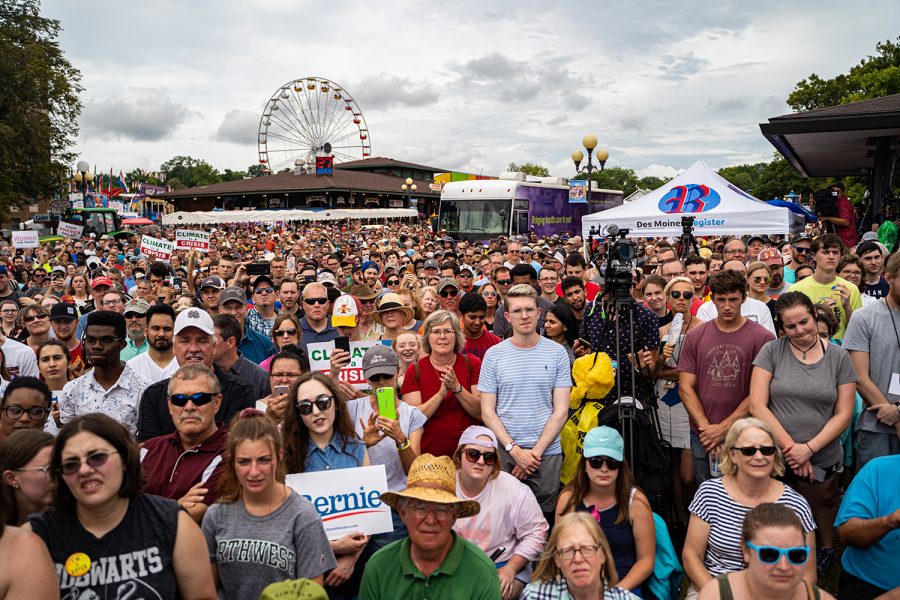The most diverse presidential field in one of the nation’s whitest states
A large majority of Iowa’s population is made up of white people, and with Iowa being a first-in-the-nation caucus state, some minority communities are not feeling engaged with 2020 presidential hopefuls.
A crowd gathers to watch Sen. Bernie Sanders speak during the Iowa State Fair in Des Moines, IA on Sunday, August 11, 2019.
Since January, The Daily Iowan has covered more than 50 events across eastern Iowa and other parts of the state that featured one or more 2020 presidential hopefuls, and one thing has proved consistent: the crowds of attendees are largely white.
Iowa City School Board member Ruthina Malone said she has seen a lack of engagement between minority communities and presidential campaigns in Iowa. Malone attended around six events in the Iowa City area so far this year and a couple in past election cycles.
“Oftentimes we see candidates showing up at predominantly black churches, and they make their pitch there, or going to predominantly black universities and colleges,” Malone said. “You can’t just do it that one time to get their support and then forget about them for four years and show up again.”
Some Iowans say 2020 presidential campaigns are not doing enough to engage the underrepresented communities in the first-in-the-nation caucus state. With white people composing 85.3 percent of Iowa’s population, the results of the Iowa caucuses are not representative of the U.S., where the national population is 60.4 percent white
Malone, an African American woman, said issues important to her in this election cycle include the wage gap among black women compared to white women and men, the child-mortality rate among black women, and affordable health care.
She said that while her identity will play a significant role in deciding who she will caucus for in February, it’s important to remember that minority communities are not monolithic groups of people with identical values.
“I’m not saying that, you know, you need to treat minorities different, but you need to treat them equally as important as other groups,” Malone said.
At an ice-cream social event hosted by Sen. Bernie Sanders, I-Vt., in West Branch, Iowa, on Aug. 19, Earnest Harvey said he took a day off of work to see the senator. Harvey said this was the first candidate he had seen so far ahead of the 2020 caucus.

Iowa caucus-goer Earnest Harvey poses for a portrait at an ice-cream social for Sen. Bernie Sanders, I-Vt., in West Branch on Aug. 19.
Harvey said his identity as an African American male will play a large role in who he caucuses for, because being an African American male is tough, he said, pointing to racist interactions between black people and police officers that sometimes go viral online. Harvey said he wants to hear candidates talk more about police brutality and how they plan to hold law-enforcement officials accountable for acts of violence.
He added that he thinks society has come a long way in terms of acceptance, but that dialogue surrounding race still needs to be more open.
“I think both sides have to open their hearts and souls and listen to one another,” Harvey said. “It’s not just all African Americans and not just all caucasions, it’s everybody.” He added that the rights of LGBTQ Americans and women were two other important issues for him.
In the 2016 presidential election, black voter-turnout rates fell for the first time in 20 years nationwide, according to the Pew Research Center. Voter-turnout rates among black voters reached a record high of 66.6 percent in 2012, and dropped to 59.6 percent in 2016. Blacks, Hispanics, Asians, and other minority groups accounted for 26.7 percent of the vote in 2016, which is unchanged from 2012.
In the 2018 midterm elections, all racial and ethnic groups saw historic increases in voter turnout nationally.
Because the state of Iowa does not ask a person to identify their race or ethnicity when they register to vote, there are no records on voter turnout among minorities in Iowa.
Deidre DeJear, the state director for Sen. Kamala Harris’ presidential campaign, said the campaign is focused on engaging the small percentages of other races that make up Iowa. DeJear said she has met Iowans who have gravitated toward her campaign because they feel like Harris represents them.
“These are folks who sometimes don’t believe that the system was meant for them to participate in just based on historical experiences, and experiences that their parents and their grandparents may have had,” DeJear said.
DeJear was the first African American woman to clinch the Democratic nomination for Iowa secretary of state in 2018. DeJear said what often happens in the realm of campaigns and politics is that people wait to engage people of color until the end of the election cycle, because people of color are often considered unreliable voters.
“And whether [people of color are] reliable or not, from our position, they should be included from the beginning and not at the end,” DeJear said. “Because people aren’t just numbers. They’re folks with issues and challenges.”
Iowa Asian and Latino Coalition Chair Prakash Kopparapu said his organization has worked to advocate for Asian and Latinx communities, especially in election years. The coalition endorsed Harris after the organization casted 300 private ballots to determine who to endorse.
Kopparapu said the 500-member organization’s goal is to help engage Asian and Latinx individuals and aspiring politicians in elections and local politics, and has since expanded the organization to include anyone who wants to join to support their mission. He said they have endorsed not just Asian and Latinx candidates, but also white and African American men and women in the Des Moines community and around the state.
“Almost all the presidential campaigns come to Iowa think they’ll be meeting 100 percent Caucasian voters, and so they staff accordingly 100 percent Caucasian staff,” Kopparapu said. “… They come here, and all of a sudden they see this Asian-Latino coalition.”
He said the organization has met with 16 presidential candidates, both before and after their endorsement, and that some candidates and campaigns such as South Bend, Indiana, Mayor Pete Buttigieg, and entrepreneur Andrew Yang made remarks about being taken aback by the large amount of members in the coalition.
Kopparapu said feeling like he is represented in a candidate’s platform is extremely important in deciding who he will vote for, whether that’s in national or local elections. He highlighted the fact that there are no elected people of color on the Des Moines City Council, and said this is an example that reflects many governing bodies in the U.S.
“The way the decisions are being made, as of today around the country, is based on if you’re there,” Kopparapu said.
Kopparapu said other candidates that were popular among the coalition for an endorsement were Yang, New Jersey Sen. Cory Booker, Minnesota Sen. Amy Klobuchar, and former Housing and Urban Development Secretary Julián Castro. He noted that Massachusetts Sen. Elizabeth Warren has not met with the coalition, saying he thinks some campaigns don’t meet with them on account of minority’s small populations in Iowa.

Sen. Cory Booker, D-NJ, speaks at the Des Moines Register Political Soapbox during the Iowa State Fair in Des Moines, IA on Saturday, August 10, 2019.
Jason Noble, Iowa communications director Warren’s presidential campaign, said in an email to the DI that the campaign’s African American coordinator has held roundtable discussions regarding the racial wealth gap and hosts other events across the state. Additionally, the Latinx coordinator is currently hosting a series of Spanish-language events around the state.
The Sanders campaign has also held roundtable discussions with underrepresented communities in Iowa.
Eventually, one of the Democratic candidates will have to face off with President Trump, who has been criticized by Democrats for villainizing Mexicans and Latinx communities crossing the U.S.-Mexico border. He’s also been called a white supremacist by some of the 2020 candidates, including former Texas Rep. Beto O’Rourke, former Vice President Joe Biden, Harris, Sanders, Warren, Yang, and Buttigieg.
This Democratic field of presidential hopefuls is one of the most diverse in American history, with five women and several people of color vying for the U.S. presidency. Harvey, an Iowa caucusgoer, said he thinks candidates often say what they think people — including minorities — want to hear, but a more important measure of character, was what they do once in office.
“It’s about what you do once you get that title,” Harvey said.
Editor’s note: The 85.3 percent referencing the amount of white people in Iowa is only accounting for white alone, not Hispanic or Latino, according to the U.S. Census.



